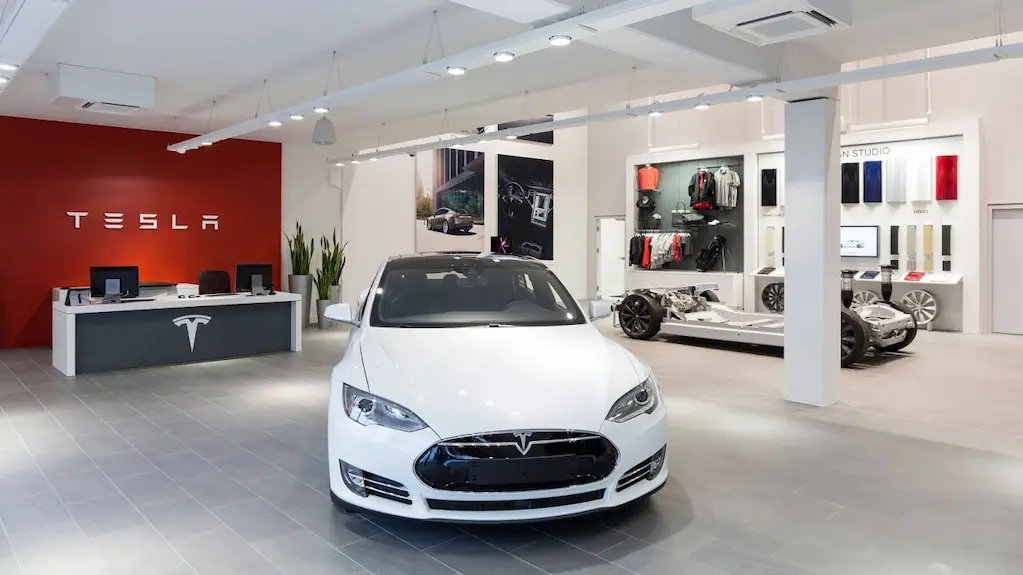
Tesla is set to open its second showroom in India on August 11, 2025, at Worldmark 3 in Aerocity New Delhi (Just a Representative image)
From Mumbai to Delhi: Tesla Strategic Expansion
Tesla Delhi Debut – Tesla is set to open its second showroom in India on August 11, 2025, at Worldmark 3 in Aerocity New Delhi, a premium commercial hub near the Indira Gandhi International Airport. This follows the company’s first showroom launch in Mumbai’s Bandra Kurla Complex (BKC) on July 15, marking a rapid expansion into India’s most EV-friendly urban markets.
Table of Contents
The Aerocity location is no accident. With its proximity to policymakers, affluent consumers, and high foot traffic, it positions Tesla to tap into the National Capital Region’s growing appetite for electric mobility. The showroom will serve as both a display center and customer experience hub, showcasing Tesla’s flagship Model Y and offering consultations for prospective buyers.
This move signals Tesla’s intent to build a strong brand presence in India ahead of potential local manufacturing and broader product rollouts.
Model Y: Specs, Pricing, and Delivery Timeline
Tesla’s India journey began with the launch of the Model Y, a mid-sized electric SUV that was once the world’s best-selling car. Imported from Tesla’s Shanghai Gigafactory, the Model Y is available in two rear-wheel drive variants:
| Variant | Battery Pack | Range (WLTP) | Price (Ex-showroom) |
|---|---|---|---|
| Standard RWD | 60 kWh | 500 km | ₹59.89 lakh |
| Long-Range RWD | 75 kWh | 622 km | ₹67.89 lakh |
- On-road prices range from ₹61.07 lakh to ₹69.15 lakh depending on location and taxes.
- Deliveries for the standard variant are expected by the end of Q3 2025, while the long-range version will follow in Q4 2025.
- Tesla offers flat-bed truck delivery directly to customers’ homes in cities like Mumbai, Pune, Delhi, and Gurugram.
The Model Y features a single electric motor delivering approximately 295 horsepower, and supports fast charging, with Tesla’s Supercharger network expanding across major metros.
Charging Infrastructure and Website Rollout
Tesla’s India strategy isn’t just about showrooms, it’s about building an ecosystem. On August 4, Tesla launched its first charging facility in India at One BKC, Mumbai, featuring:
- 4 V4 Supercharging stalls (DC charging) with speeds up to 250 kW at ₹24/kWh
- 4 destination charging stalls (AC charging) offering 11 kW at ₹14/kWh
The company plans to open three more charging stations in Lower Parel, Thane, and Navi Mumbai by the end of Q3.
Tesla also activated its official India website, allowing users to register interest and begin vehicle configuration. Initially limited to Mumbai, Delhi, and Gurugram, the site now supports registration across all states and union territories, signaling a nationwide rollout.
What This Means for India’s EV Landscape
Tesla’s entry into India is more than a commercial move, it’s a catalyst for change. With the government pushing for 30% EV adoption by 2030, Tesla’s presence adds momentum to the shift toward clean mobility.
Key implications:
- Consumer Awareness: Tesla’s brand power can accelerate public interest in EVs.
- Policy Engagement: The Aerocity showroom places Tesla near regulators, potentially influencing future EV policies.
- Infrastructure Development: Tesla’s charging network could set benchmarks for speed, reliability, and pricing.
- Local Manufacturing Potential: While Tesla currently imports vehicles, its expansion hints at future R&D and production facilities, especially if import tariffs are revised.
India’s EV market is projected to grow at a CAGR of 44% over the next five years. Tesla’s strategic positioning in Delhi and Mumbai ensures it’s at the heart of this transformation.
India’s electric vehicle (EV) market is on the cusp of a transformative boom, expected to grow at a compound annual growth rate (CAGR) of 44% over the next five years. This surge is fueled by supportive government policies, rising fuel prices, and growing environmental consciousness among consumers. Advances in battery technology, expansion of charging infrastructure, and increased investment from global and domestic players are accelerating adoption across two-wheelers, cars, and commercial vehicles. As urban centers grapple with pollution and congestion, EVs offer a cleaner, more sustainable alternative. This growth signals a pivotal shift in India’s transportation landscape toward electrification
Also read – Tesla Model Y – Grand Debut in India: A Thrilling Leap Into the Future of Mobility